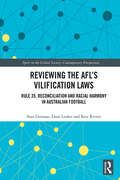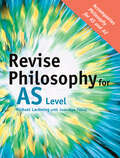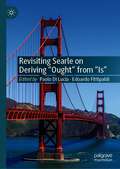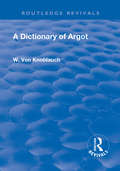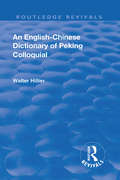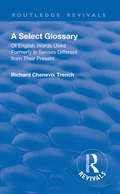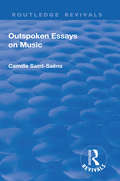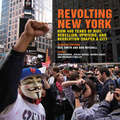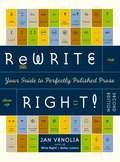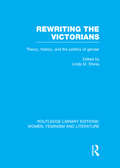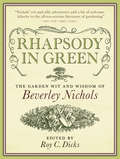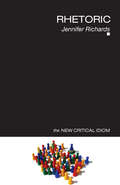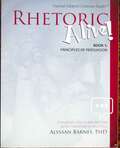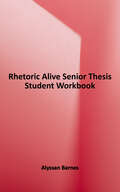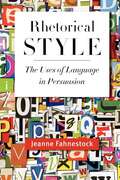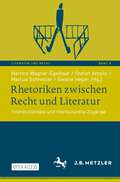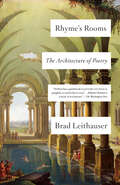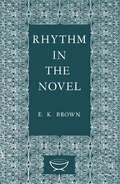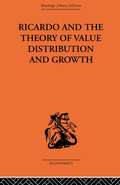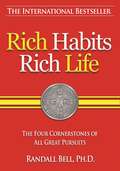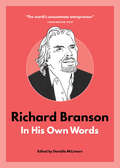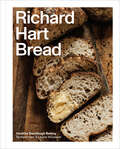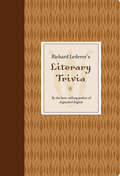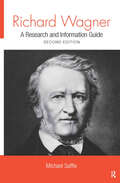- Table View
- List View
Reviewing the AFL�s Vilification Laws: Rule 35, Reconciliation and Racial Harmony in Australian Football (Sport in the Global Society – Contemporary Perspectives)
by Dean Lusher Sean Gorman Keir ReevesThis book is the outcome of an Australian Research Council (ARC)-funded project titled Assessing the Australian Football League’s Racial and Religious Vilification Laws to Promote Community Harmony, Multiculturalism and Reconciliation, which investigated the impact of the Australian Football League’s anti-vilification policy since its introduction in 1995. With key stakeholders the Australian Football League, the AFL Players’ Association and the Office of Multicultural Affairs (previously the Victorian Multicultural Commission), the book gauges the attitudes and perspectives of players and coaches in the AFL regarding Rule 35, the code’s anti-vilification rule. The overarching themes of multiculturalism, reconciliation and social harmony in the AFL workplace have been the guiding ideals that we examined and analysed. The outcomes from the research vectors look at and engage with key issues about race, diversity and difference as it pertains to the elite AFL code, but also looks at the ongoing international conversation as it pertains to these themes in sport. This book was previously published as a special issue of Sport in Society.
Revise Philosophy for AS Level
by Michael LacewingRevise Philosophy for AS Level is the definitive revision guide for students of the Advanced Subsidiary level syllabus. Following the AQA syllabus, it helps students revise using past exam questions, examiner's reports, and tips on revision for the examination. Also included are a helpful glossary and annotated further reading. It covers all three units of the AS Level syllabus: Unit 1: Theory of Knowledge Unit 2: Moral Philosophy and Philosophy of Religion Unit 3: Texts. The four set texts are discussed: Plato's The Republic, Descartes' Meditations, Marx and Engels’ The German Ideology and Sartre’s Existentialism and Humanism. Essential reading for all students of AS Level Philosophy, it is an ideal companion to the textbook Philosophy for AS and A2, also published by Routledge.
Revisiting Searle on Deriving "Ought" from "Is"
by Paolo Di Lucia Edoardo FittipaldiThis book reconsiders the supposed impossibility of deriving "Ought" from "Is". John R. Searle’s 1964 article How to Derive "Ought " from "Is’’ sent shockwaves through the philosophical community by offering a straightforward counterexample to this claim of impossibility: from your promising something- and this is an "is" - it simply follows that you "ought" to do it. This volume opens with a brand new chapter from Searle who, in light of his subsequent philosophical developments, expounds the reasons for the validity of that derivation and its crucial significance for social ontology and moral philosophy. Then, in a fresh interview with the editors of this volume, Searle explores a range of topics including how his derivation relates to constitutive rules, and how he views Wittgenstein’s philosophy, deontic logic, and the rationality of action. The remainder of the volume is dedicated to a deep dive into Searle’s essay and its implications by international scholars with diverse backgrounds ranging from analytic philosophy, phenomenology, and logic, to moral philosophy and the philosophy and sociology of law. With thirteen original chapters, the contributors provide fresh and timely insights on hotly debated issues: the nature of "Ought"; the logical structure of the social world; and the possibility of deriving not only "Ought" from "Is", but "Is" from "Ought".
Revival: (French-English) (Routledge Revivals)
by W Knoblauch vonStudents and Readers of French Literature, who require a more complete dictionary of Argot than the present volume, should consult these learned and excellent works.
Revival: New Edition Enlarged by Sir Trelawny Backhouse and Sidney Barton (Routledge Revivals)
by Walter Caine HillierMany of the marks attached to the phonetic rendering of the Chinese words in this volume differ from those assigned to them in the dictionaries. These apparent discrepencies are intentional, the tones being given as they are applied, or appear to the ear of the compiler to be applied, by the natives of Peking.
Revival: Of English Words Used Formerly in Senses Different from their Present (Routledge Revivals)
by Richard Chenevix TrenchThis volume is intended to be a contribution to a special branch of the study of our own language. It proposes to trace in a popular manner and for general readers the changes of meaning which so many of its words have undergone; words which, as current with us as they were with out forefathers, yet meant something different on their lips from what they mean on ours.
Revival: Outspoken Essays on Music (Routledge Revivals)
by Camille Saint-SaensA series of essays on reactions and emotional responses to music.
Revolting New York: How 400 Years of Riot, Rebellion, Uprising, and Revolution Shaped a City (Geographies of Justice and Social Transformation #38)
by Neil Smith and Don MitchellA comprehensive guide to New York City&’s historical geography of social and political movements. Occupy Wall Street did not come from nowhere. It was part of a long history of uprising that has shaped New York City. From the earliest European colonization to the present, New Yorkers have been revolting. Hard hitting, revealing, and insightful, Revolting New York tells the story of New York&’s evolution through revolution, a story of near-continuous popular (and sometimes not-so-popular) uprising. Richly illustrated with more than ninety historical and contemporary images, historical maps, and maps drawn especially for the book, Revolting New York provides the first comprehensive account of the historical geography of revolt in New York, from the earliest uprisings of the Munsee against the Dutch occupation of Manhattan in the seventeenth century to the Black Lives Matter movement and the unrest of the Trump era. Through this rich narrative, editors Neil Smith and Don Mitchell reveal a continuous, if varied and punctuated, history of rebellion in New York that is as vital as the more standard histories of formal politics, planning, economic growth, and restructuring that largely define our consciousness of New York&’s story.Contributors: Marnie Brady, Kathleen Dunn, Zultán Gluck, Rachel Goffe, Harmony Goldberg, Amanda Huron, Malav Kanuga, Esteban Kelly, Manissa McCleave Maharawal, Don Mitchell, Justin Sean Myers, Brendan P. O&’Malley, Raymond Pettit, Miguelina Rodriguez, Jenjoy Roybal, McNair Scott, Erin Siodmak, Neil Smith, Peter Waldman, and Nicole Watson.&“The writing is first-rate, with ample illustrations and many contemporary and historical images. Fast paced and fascinating, like the city it profiles.&”—Library Journal
Rewrite Right!: Your Guide to Perfectly Polished Prose
by Jan Venolia Ellen SasakiEveryone knows that writing can be improved by the simple process of reviewing, editing, and rewriting, but many struggle with how to go about critiquing their own work-be it a letter to a friend, an important business document, or an academic essay. Fortunately, help is at hand in REWRITE RIGHT!, the definitive guide to polishing your prose. According to writing authority Jan Venolia, the skills needed to revise your work are surprisingly easy to learn and a cinch to incorporate into everyday writing routines. This practical guide describes in clear, direct language how to effectively rewrite a report, letter, essay, or article, so that writers of all levels can improve the quality of their work and harness the power of language.From the Trade Paperback edition.
Rewriting the Victorians: Theory, History, and the Politics of Gender (Routledge Library Editions: Women, Feminism and Literature)
by Linda M. ShiresThis collection of essays, both feminist and historical, analyzes power relations between men and women in the Victorian period. This volume is the first to reshape Victorian studies from the perspective of the postmodern return to history, and is variously influenced by Marxism, sociology, anthropology, and post-structuralist theories of language and subjectivity. It analyzes the struggle for legitimacy and recognition in Victorian institutions and the struggle over meanings in ideological representation of the gendered subject in texts. Contributors cover diverse topics, including Victorian ideologies of motherhood, the male gaze, the cult of the male child genius in narrative painting, the press, and Victorian women and the French Revolution, discussing both well-known and less familiar Victorian texts.
Rhapsody in Green: The Garden Wit and Wisdom of Beverley Nichols
by Beverley Nichols Roy C. DicksBeverley Nichols (1898–1983) was a prolific author, playwright, composer, and media personality. Though much of his work has been forgotten, his garden writing has stood the test of time. His amusing anecdotes, poetic contemplations, and penetrating observations speak to all gardeners—from houseplant killers to nursery professionals—and capture the joy, heartache, and hilarity of gardening.Rhapsody in Green speaks to the true spirit of Beverley Nichols. Compiled by Roy C. Dicks and drawn from fifteen of his best titles, these carefully selected passages offer a tantalizing taste of Nichols's humor, passion, and poetry. Designed for easy browsing and casual reference, it is organized by subject, including favorite plants, despised plants, and the secrets to successful gardening. Readers will also delight in William McLaren's original line drawings spread throughout the text. A must-have for Nichols fans, gardeners, and plant lovers.
Rhetoric (The New Critical Idiom)
by Jennifer RichardsRhetoric has shaped our understanding of the nature of language and the purpose of literature for over two millennia. It is of crucial importance in understanding the development of literary history as well as elements of philosophy, politics and culture. The nature and practise of rhetoric was central to Classical, Renaissance and Enlightenment cultures and its relevance continues in our own postmodern world to inspire further debate.Examining both the practice and theory of this controversial concept, Jennifer Richards explores: historical and contemporary definitions of the term ‘rhetoric’ uses of rhetoric in literature, by authors such as William Shakespeare, Mary Shelley, William Wordsworth, Jane Austen, W.B. Yeats and James Joyce classical traditions of rhetoric, as seen in the work of Plato, Aristotle and Cicero the rebirth of rhetoric in the Renaissance and the Enlightenment the current status and future of rhetoric in literary and critical theory as envisaged by critics such as Kenneth Burke, Paul de Man and Jacques Derrida. This insightful volume offers an accessible account of this contentious yet unavoidable term, making this book invaluable reading for students of literature, philosophy and cultural studies.
Rhetoric Alive! Book 1: Principles of Persuasion
by Alyssan BarnesA one-semester or yearlong course for students in grades 10-12. Rhetoric Alive! Book 1: Principles of Persuasion, written by Alyssan Barnes, an experienced rhetoric teacher with a PhD in rhetoric, is a clear, compelling, and delightful text on rhetorical theory and practice. The highly engaging Rhetoric Alive! explores the principles of winsome speech as developed in the foremost text on persuasion, Aristotle's Rhetoric. The fifteen chapters of Rhetoric Alive! step through the essential components of persuasion: the three appeals; Ethos (speaker's credibility), Pathos (audience's emotion), and Logos (argument's reasoning), the three types of speech; Deliberative (exhort or dissuade), Ceremonial (praise or blame), Judicial (accuse or defend), and the five canons; Invention, Organization, Style, Memory, Delivery. Each chapter includes an exemplary classic text for analysis and discussion, spanning from Pericles's 'Funeral Oration' to Martin Luther King, Jr.'s, 'Letter from Birmingham Jail.' Students also have plenty of practice developing their own rhetorical skill through weekly workshops, imitation assignments, and oratory presentations.
Rhetoric Alive! Senior Thesis Student Workbook
by Alyssan BarnesA yearlong course for grades 11-12 The senior thesis is a capstone project, the crowning achievement in a student's academic journey. In completing the thesis, students bring all that they've learned, such as reading, writing, and arguing, to bear on one issue. They learn the background of the topic, analyze other people's arguments, and synthesize their findings and discoveries, putting it all together to form a true, good, and beautiful whole. Through the use of workshops, assignments, and presentation practices, the Rhetoric Alive! Senior Thesis workbook walks students step-by-step through the process of writing and then delivering a thesis. Students will gradually draft the six parts of the thesis introduction (exordium), statement of facts (narratio), thesis statement (partitio), argument (confirmatio), counterargument (refutatio), and conclusion (peroratio) as they are taken through the thesis process from start to finish, from choosing a topic to crafting a snappy title, and everything in between. Versatile and straightforward, this text can be used by students who are only writing a thesis paper, only delivering a spoken address, or doing both. Additionally, the genius of Rhetoric Alive! Senior Thesis is that it can be utilized by students using any rhetoric curriculum and even by strong students who have not yet studied rhetoric. Rhetoric Alive! Senior Thesis is an all-in-one resource journal/scratch pad/research notebook and rough-draft-to-final-copy writing guide that will equip students to create a strong, compelling, and well-crafted senior thesis. The text is spiral bound so that students can easily draft portions of their theses and take notes in the workbook, either in class or at home. What sets Rhetoric Alive! Senior Thesis apart from other rhetoric texts? -RA Thesis can be used in conjunction with any rhetoric curriculum -RA Thesis uses clear, accessible language -RA Thesis takes students step-by-step through the writing of the thesis, from start to finish -RA Thesis aids students in writing a paper, speech, or both -RA Thesis helps reluctant or struggling writers generate good ideas and organize them well -RA Thesis contains presentation practice and writing workshops in each chapter -RA Thesis supplies tips from former senior thesis students -RA Thesis includes sample student writing and an example of a complete student thesis -RA Thesis brings classical rhetorical theory to bear on a contemporary issue
Rhetoric and Composition
by Steven LynnRhetoric and composition is an academic discipline that informs all other fields in teaching students how to communicate their ideas and construct their arguments. It has grown dramatically to become a cornerstone of many undergraduate courses and curricula, and it is a particularly dynamic field for scholarly research. This book offers an accessible introduction to teaching and studying rhetoric and composition. By combining the history of rhetoric, explorations of its underlying theories, and a survey of current research (with practical examples and advice), Steven Lynn offers a solid foundation for further study in the field. Readers will find useful information on how students have been taught to invent and organize materials, to express themselves correctly and effectively, and how the ancient study of memory and delivery illuminates discourse and pedagogy today. This concise book thus provides a starting point for learning about the discipline that engages writing, thinking, and argument.
Rhetorical Style: The Uses Of Language In Persuasion
by Jeanne FahnestockA comprehensive guide to the language of argument, Rhetorical Style offers a renewed appreciation of the persuasive power of the English language. Drawing on key texts from the rhetorical tradition, as well as on newer approaches from linguistics and literary stylistics, Fahnestock demonstrates how word choice, sentence form, and passage construction can combine to create effective spoken and written arguments. With examples from political speeches, non-fiction works, and newspaper reports, Rhetorical Style surveys the arguer's options at the word, sentence, interactive, and passage levels, and illustrates the enduring usefulness of rhetorical stylistics in analyzing and constructing arguments.
Rhetoriken zwischen Recht und Literatur: Interdisziplinäre und interkulturelle Zugänge (Literatur und Recht #9)
by Martina Wagner-Egelhaaf Stefan Arnold Marcus Schnetter Gesine HegerDie Beiträge dieses Open-Access-Buchs diskutieren das Verständnis von Rhetorik, mit dem heute in Literatur- und Rechtswissenschaft gearbeitet wird. Sie beleuchten, inwiefern sich die westliche Tradition von rhetorischen Perspektiven aus anderen Sprach-, Kultur- und Rechtsräumen unterscheidet. Während die Rhetorik in antiker Tradition in der Literaturtheorie nach wie vor eine große Rolle spielt, hat sie ihren Status als Leitdisziplin in den Rechtswissenschaften eingebüßt und ist lediglich für Teilbereiche wie Argumentationstheorie und Rechtslogik relevant. Der Band nimmt Recht und Literatur in ihrer gemeinsamen sprachlichen Konstitution ernst und fragt nicht zuletzt nach einem geteilten Grundverständnis von Rhetorik.
Rhyme's Rooms: The Architecture of Poetry
by Brad LeithauserFrom the widely acclaimed poet, novelist, critic, and scholar, a lucid and edifying exploration of the building blocks of poetry and how they've been used over the centuries to assemble the most imperishable poems.&“Anyone wanting to learn how to remodel, restore, or build a poem from the foundation up, will find this room-by-room guide on the architecture of poetry a warm companion.&” —Tomás Q. Morín, author of MacheteWe treasure our greatest poetry, Brad Leithauser reminds us in these pages, "not for its what but its how." In chapters on everything from iambic pentameter to how stanzas are put together to "rhyme and the way we really talk," Leithauser takes a deep dive into that how—the very architecture of poetry. He explains how meter and rhyme work in fruitful opposition ("Meter is prospective; rhyme is retrospective"); how the weirdnesses of spelling in English are a boon to the poet; why an off rhyme will often succeed where a perfect rhyme would not; why Shakespeare and Frost can sound so similar, despite the centuries separating them. And Leithauser is just as likely to invoke Cole Porter, Stephen Sondheim, or Boz Scaggs as he is Chaucer or Milton, Bishop or Swenson, providing enlightening play-by-plays of their memorable lines.Here is both an indispensable learning tool and a delightful journey into the art of the poem—a chance for new poets and readers of poetry to grasp the fundamentals, and for experienced poets and readers to rediscover excellent works in all their fascinating detail.Portions of this book have appeared in The New Yorker, The New York Times, and The New York Review of Books.
Rhythm in the Novel
by E. K. BrownThe Alexander Lectures for 1949-50. In his Preface, Professor Brown says, "Isolating a single element or group of elements in the novel, and considering it in unreal separation from all the other elements which it actually fuses, is artificial, but so is all criticism. The artificiality is justified if when one turns back from the criticism to the novels these appear more intelligible and more delightful. That is the test." Applying the test to Dr. Brown's present work, the method is more than justified by the results. they are titled: "Phrase, Character, Incident," "Expanding Symbols," "Interweaving Themes," and "Rhythm in E.M. Forster's A Passage to India."
Ricardo and the Theory of Value Distribution and Growth (Routledge Library Editions)
by Giovanni A. Caravale Domenico A. TosatoThe book presents a rigorous reconstruction of Ricardo's contribution to economic theory and a unifying interpretation of the key issues of Ricardo's research. Part One deals primarily with the problems of value and distribution Part Two deals specifically with the issues of distribution and growth. * Contemporary economic literature in the fields of value, distribution and growth is witnessing a renewed interest in the approach of the classical school, notably in the work of David Ricardo.
Rich Habits Rich Life: The Four Cornerstones of All Great Pursuits
by Randall BellWhat is a winning strategy? Why do some people, families, and organizations take a dive, some merely survive, while others thrive? What leads up to a disaster or collapse? Why do some squander success, while others continue to elevate? How do we build a solid foundation that assures solid authentic growth? Rich Habits Rich Life is the result of research that has spanned over 25 years at the intersection of sociology and economics, and specifically explores what behaviors result in disaster, recovery, and prosperity.
Richard Branson: In His Own Words (In Their Own Words)
by Danielle McLimoreA look into the mind of &“the world&’s consummate entrepreneur&” through his quotes on leadership, branding, innovation, social responsibility, and more (Huffington Post). Richard Branson, who has been called &“England&’s most outrageous billionaire,&” is also one of the world&’s most successful business leaders. Since the age of 16, when he founded Student magazine, Branson has been creating companies and finding innovative ways to grow them into the prodigious conglomerate known as the Virgin Group. At the age of 20, Branson founded a mail-order record retailer. Two years later he built a recording studio where the first artist signed to his Virgin label, Mike Oldfield, recorded the haunting soundtrack to The Exorcist. Decades later, industries as varied as entertainment (Virgin Music), retail (Virgin Megastores), transportation (Virgin Airlines), and telecommunications (Virgin Mobile) all bear Branson&’s business moniker. For the first time, the most thought-provoking, revealing, and inspiring quotes from Branson have been compiled in a single book. Updated and redesigned since its initial publication in 2013 as Virgin Rebel: Richard Branson in His Own Words, this new edition is a comprehensive guidebook to the inner workings of the Virgin Group chairman and founder. Hundreds of Branson&’s best quotes, comprising thoughts on business, music, entrepreneurship, politics, exploration, and life lessons, provide an intimate and direct look into the mind of this modern business icon. &“I have no secret. There are no rules to follow in business. I just work hard and, as I always have done, believe I can do it.&” —Screw It, Let&’s Do It, page 30
Richard Hart Bread: Intuitive Sourdough Baking
by Richard Hart Laurie WooleverA comprehensive guide to the craft of baking bread, featuring more than 60 recipes filled with all the expertise and experience of the founder of Copenhagen&’s Hart Bageri and former head baker at San Francisco&’s Tartine.&“Sourdough bakers have a serious contender for a new bread bible.&”—Plate &“Richard Hart restores the heart to bread baking.&”—Yotam OttolenghiRichard Hart Bread is the guide to the intuitive art of baking bread. By learning how to see, taste, touch, and adapt, readers can find their own way to making truly wonderful bread—from blistering sourdoughs to rich rye pan loaves and more. Rather than focusing obsessively on precise formulas, Richard teaches both aspiring and seasoned bakers all his key techniques without holding anything back.Through gorgeous photography, explanatory videos accessed on page through QR codes, and thorough descriptions of methods, you&’ll have all the tools you need to make great breads. Rich in stories and Richard&’s boundless enthusiasm, this book will make you fall ever deeper in love with bread.
Richard Lederer's Literary Trivia: From Mythology, Shakespeare, And The Bible [standard Large Print 16 Pt Edition]
by Richard LedererThe author of Anguished English presents a compendium of fascinating facts and anecdotes about some of literature&’s greatest authors and works. Author and English teacher Richard Lederer is one of the world&’s foremost lovers of language and literature. In this endlessly engaging volume, he collects some of the most curious trivia about world-renowned authors and poets as well as their many immortal creations. The perfect gift for bibliophiles, Richard Lederer&’s Literary Trivia sheds surprising new light on the books and writers we love.
Richard Wagner: A Research and Information Guide (Routledge Music Bibliographies)
by Michael SaffleRichard Wagner: A Research and Information Guide is an annotated bibliography concerning both the nature of primary sources related to the composer and the scope and significance of the secondary sources which deal with him, his compositions, and his influence as a composer and performer.
